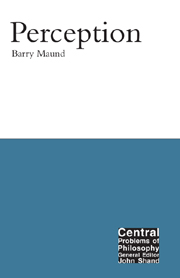Book contents
- Frontmatter
- Contents
- Preface
- 1 The philosophy of perception
- 2 A theory of natural realism
- 3 Theories of perceptual experiences
- 4 Representationalism: representations as natural signs
- 5 Natural realism: Putnam, Austin and Heidegger
- 6 Perception: the argument from illusion
- 7 The phenomenal and phenomenological senses of “looks”
- 8 Types of perceptual content
- 9 The representationalist–intentionalist thesis
- 10 Adverbialist accounts of perceptual experience
- Conclusion
- Notes
- References
- Index
6 - Perception: the argument from illusion
- Frontmatter
- Contents
- Preface
- 1 The philosophy of perception
- 2 A theory of natural realism
- 3 Theories of perceptual experiences
- 4 Representationalism: representations as natural signs
- 5 Natural realism: Putnam, Austin and Heidegger
- 6 Perception: the argument from illusion
- 7 The phenomenal and phenomenological senses of “looks”
- 8 Types of perceptual content
- 9 The representationalist–intentionalist thesis
- 10 Adverbialist accounts of perceptual experience
- Conclusion
- Notes
- References
- Index
Summary
One of the dominant motifs concerning perception in the Western philosophical tradition is the argument from illusion, understood in a wide sense as incorporating a range of variants. The argument in its various forms is commonly taken to establish the following doctrine:
we never see or otherwise perceive or anyhow never directly perceive or sense, material objects (or material things), but only sense-data (or own ideas, impressions, sensa, sense-perceptions, percepts, etc.).
This at least is the version that Austin attacks. Following our discussion in Chapter 5, let us suppose that the doctrine should be formulated as:
we never see or otherwise perceive material objects (or material things), except by being aware of, or sensing sense-data (or our ideas, impressions, sensa, sense-perceptions, percepts, etc.), items that are not themselves material things.
Despite its long history, however, misconceptions about the nature of the argument abound. This has been especially true in the last part of the twentieth century, when the argument tended to get short shrift. One of the major sources for this dismissal is the treatment the argument receives at the hands of Austin in his Sense and Sensibilia. This book lies at the heart of Putnam's defence of what he calls “natural realism” in the Dewey Lectures. (See also his The Threefold Cord: Mind, Body, and the World.) The influence of this book is widespread, although it may not be that all the blame can be laid at the door of Austin.
- Type
- Chapter
- Information
- Perception , pp. 111 - 130Publisher: Acumen PublishingPrint publication year: 2002

